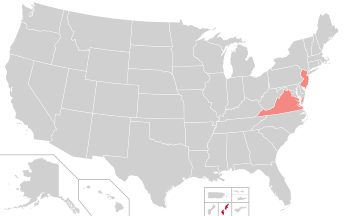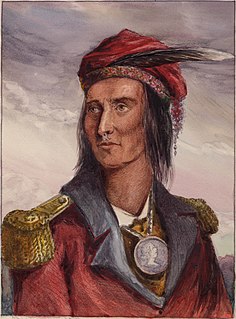| ||||||||||||||||||||||
3 governorships 2 states; 1 territory | ||||||||||||||||||||||
|---|---|---|---|---|---|---|---|---|---|---|---|---|---|---|---|---|---|---|---|---|---|---|
| ||||||||||||||||||||||
 Map of the results Republican gain Republican hold No election | ||||||||||||||||||||||
United States gubernatorial elections were held on November 4, 1997, in two states and one territory. Republicans retained both seats.
| ||||||||||||||||||||||
3 governorships 2 states; 1 territory | ||||||||||||||||||||||
|---|---|---|---|---|---|---|---|---|---|---|---|---|---|---|---|---|---|---|---|---|---|---|
| ||||||||||||||||||||||
 Map of the results Republican gain Republican hold No election | ||||||||||||||||||||||
United States gubernatorial elections were held on November 4, 1997, in two states and one territory. Republicans retained both seats.
| State | Incumbent | Party | First elected | Result | Candidates |
|---|---|---|---|---|---|
| New Jersey | Christine Todd Whitman | Republican | 1993 | Incumbent re-elected. |
|
| Virginia | George Allen | Republican | 1993 | Incumbent term-limited. New governor elected. Republican hold. |
|
| State | Incumbent | Party | First elected | Result | Candidates |
|---|---|---|---|---|---|
| Northern Mariana Islands | Froilan Tenorio | Democratic | 1993 | Incumbent lost re-election. New governor elected. [1] Republican gain. |
|
States where the margin of victory was under 5%:

Theodore Roosevelt Jr., often referred to as Teddy or his initials T. R., was an American politician, statesman, conservationist, naturalist, historian, and writer who served as the 26th president of the United States from 1901 to 1909. He previously served as the 25th vice president under William McKinley from March to September 1901, and as the 33rd governor of New York from 1899 to 1900. Having assumed the presidency after McKinley's assassination, Roosevelt emerged as a leader of the Republican Party and became a driving force for anti-trust and Progressive policies.

The Seventeenth Amendment to the United States Constitution established the direct election of United States senators in each state. The amendment supersedes Article I, §3, Clauses 1 and 2 of the Constitution, under which senators were elected by state legislatures. It also alters the procedure for filling vacancies in the Senate, allowing for state legislatures to permit their governors to make temporary appointments until a special election can be held.

USS Constitution, also known as Old Ironsides, is a three-masted wooden-hulled heavy frigate of the United States Navy. She is the world's oldest ship of any type still afloat. She was launched in 1797, one of six original frigates authorized for construction by the Naval Act of 1794 and the third constructed. The name "Constitution" was among ten names submitted to President George Washington by Secretary of War Timothy Pickering in March of 1795 for the frigates that were to be constructed. Joshua Humphreys designed the frigates to be the young Navy's capital ships, and so Constitution and her sister ships were larger and more heavily armed and built than standard frigates of the period. She was built at Edmund Hartt's shipyard in the North End of Boston, Massachusetts. Her first duties were to provide protection for American merchant shipping during the Quasi-War with France and to defeat the Barbary pirates in the First Barbary War.

World War II or the Second World War, often abbreviated as WWII or WW2, was a global war that lasted from 1939 to 1945. It involved the vast majority of the world's countries—including all of the great powers—forming two opposing military alliances: the Allies and the Axis powers. In a total war directly involving more than 100 million personnel from more than 30 countries, the major participants threw their entire economic, industrial, and scientific capabilities behind the war effort, blurring the distinction between civilian and military resources. Aircraft played a major role in the conflict, enabling the strategic bombing of population centres and the only two uses of nuclear weapons in war. World War II was by far the deadliest conflict in human history; it resulted in 70 to 85 million fatalities, a majority being civilians. Tens of millions of people died due to genocides, starvation, massacres, and disease. In the wake of the Axis defeat, Germany and Japan were occupied, and war crimes tribunals were conducted against German and Japanese leaders.

Daniel Webster was an American lawyer and statesman who represented New Hampshire and Massachusetts in the U.S. Congress and served as the U.S. Secretary of State under Presidents William Henry Harrison, John Tyler, and Millard Fillmore. Webster was one of the most prominent American lawyers of the 19th century, and argued over 200 cases before the U.S. Supreme Court between 1814 and his death in 1852. During his life, he was a member of the Federalist Party, the National Republican Party, and the Whig Party.

Schindler's List is a 1993 American historical drama film directed and produced by Steven Spielberg and written by Steven Zaillian. It is based on the 1982 non-fiction novel Schindler's Ark by Australian novelist Thomas Keneally. The film follows Oskar Schindler, a German industrialist who saved more than a thousand mostly Polish-Jewish refugees from the Holocaust by employing them in his factories during World War II. It stars Liam Neeson as Schindler, Ralph Fiennes as SS officer Amon Göth, and Ben Kingsley as Schindler's Jewish accountant Itzhak Stern.

Earl Warren was an American lawyer, politician, and jurist who served as the 14th Chief Justice of the United States from 1953 to 1969. The Warren Court presided over a major shift in American constitutional jurisprudence, which has been recognized by many as a "Constitutional Revolution" in the liberal direction, with Warren writing the majority opinions in landmark cases such as Brown v. Board of Education (1954), Reynolds v. Sims (1964), Miranda v. Arizona (1966) and Loving v. Virginia (1967). Warren also led the Warren Commission, a presidential commission that investigated the 1963 assassination of President John F. Kennedy. Warren also served as Governor of California from 1943 to 1953, and is the last chief justice to have served in an elected office before nomination to the Supreme Court. Warren is generally considered to be one of the most influential Supreme Court justices and political leaders in the history of the United States.

Madeleine Jana Korbel Albright was an American diplomat and political scientist who served as the 64th United States secretary of state from 1997 to 2001. A member of the Democratic Party, Albright was the first woman to hold that post.

Tecumseh was a Shawnee chief and warrior who promoted resistance to the expansion of the United States onto Native American lands. A persuasive orator, Tecumseh traveled widely, forming a Native American confederacy and promoting intertribal unity. Even though his efforts to unite Native Americans ended with his death in the War of 1812, he became an iconic folk hero in American, Indigenous, and Canadian popular history.

The Imperial Japanese Navy was the navy of the Empire of Japan from 1868 to 1945, when it was dissolved following Japan's surrender in World War II. The Japan Maritime Self-Defense Force (JMSDF) was formed between 1952–1954 after the dissolution of the IJN.

The 7th World Championships in Athletics, a World Athletic Championships event held under the auspices of the International Association of Athletics Federations, were held at the Estadio Olímpico, Seville, Spain, between the August 20 and August 29.

The United States of America, commonly known as the United States or simply America, is a country primarily located in North America. It consists of 50 states, a federal district, five major unincorporated territories, 326 Indian reservations, and nine minor outlying islands. At nearly 3.8 million square miles, it is the world's fourth-largest country by land area and third-largest by total area. The United States shares land borders with Canada to the north and Mexico to the south as well as maritime borders with the Bahamas, Cuba, and Russia, among others. With more than 331 million people, it is the third most populous country in the world. The national capital is Washington, D.C., and the most populous city and financial center is New York City.

Ernesto "Che" Guevara was an Argentine Marxist revolutionary, physician, writer, guerrilla leader, diplomat, and military theorist. A major figure of the Cuban Revolution, his stylized visage has become a ubiquitous countercultural symbol of rebellion and global insignia in popular culture.

NATO is an international military alliance that consists of 30 member states from Europe, North America, and Asia. It was established at the signing of the North Atlantic Treaty on 4 April 1949. Article Five of the treaty states that if an armed attack occurs against one of the member states, it shall be considered an attack against all members, and other members shall assist the attacked member, with armed forces if necessary.

The United States dollar is the official currency of the United States and several other countries. The Coinage Act of 1792 introduced the U.S. dollar at par with the Spanish silver dollar, divided it into 100 cents, and authorized the minting of coins denominated in dollars and cents. U.S. banknotes are issued in the form of Federal Reserve Notes, popularly called greenbacks due to their predominantly green color.

A continent is any of several large landmasses. Generally identified by convention rather than any strict criteria, up to seven geographical regions are commonly regarded as continents. Ordered from largest in area to smallest, these seven regions are: Asia, Africa, North America, South America, Antarctica, Europe, and Australia. Variations with fewer continents may merge some of these, for example some systems include Afro-Eurasia, the Americas or Eurasia as single continents. Zealandia, a largely submerged mass of continental crust, has also been described as a continent.

The United States Army Air Forces was the major land-based aerial warfare service component of the United States Army and de facto aerial warfare service branch of the United States during and immediately after World War II (1941–1945). It was created on 20 June 1941 as successor to the previous United States Army Air Corps and is the direct predecessor of the United States Air Force, today one of the six armed forces of the United States. The AAF was a component of the United States Army, which on 2 March 1942 was divided functionally by executive order into three autonomous forces: the Army Ground Forces, the United States Army Services of Supply, and the Army Air Forces. Each of these forces had a commanding general who reported directly to the Army Chief of Staff.
There were several special elections to the United States House of Representatives in 1923, spanning the 67th United States Congress and 68th United States Congress.
There were several special elections to the United States House of Representatives in 1883 during the 47th and 48th Congresses.